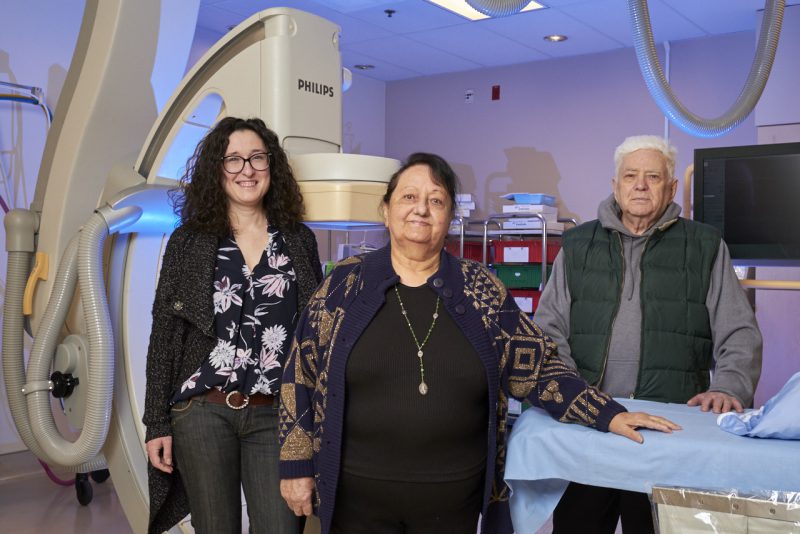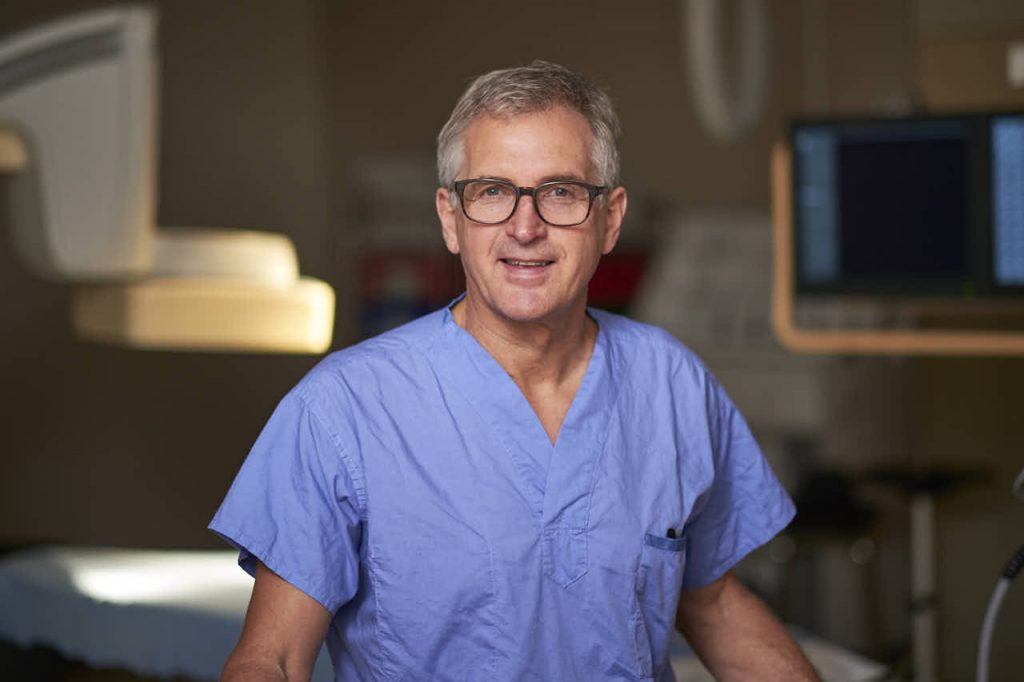
Rozalia Stil (middle) with X-ray tech Ganna Tashev and Eduard Stil pose inside an ablation procedure room more than five years after her first treatment for liver cancer.
Speaking through a Russian interpreter, Rozalia remembers wanting to give up after her diagnosis. “I can’t believe that I stopped fighting, and everybody else kept going,” she recalls.
After the liver cancer was found, Rozalia met a series of physicians, eventually leading her to Dr. Brad Halkier, an interventional radiologist who performs ablation therapy. Image-guided thermal ablation is a non-surgical treatment for some cancers that affect the liver, lung, kidney, bone and soft tissues.
“We are extremely grateful to be one of the few centers in Canada to be doing a large range of different types of ablations,” explains Dr. Halkier, “and to have the experience to be able to think and work outside the box on occasion to treat tumours that might not otherwise get care.”
Interventional radiologist Dr. Brad Halkier.
For Rozalia, surgery had been ruled out because of multiple cancerous spots on her liver. In addition, she learned during testing that she had hepatitis C. However, Dr. Halkier and a multidisciplinary team still believed they could help her.
There are three main ablation techniques: radiofrequency and microwave ablation, which both kill tumours with heat, and cryoablation, which accomplishes its task by freezing.
“Each type of ablation has its own niche,” says Dr. Halkier, who has been at Royal Columbian since 1988 and started performing ablations in 2004. “We are fortunate to have access to all three types of ablation units at Royal Columbian.”
Freezing or heating energy is delivered into the tumour by advancing thin needles or probes through the skin into the cancer using guidance with CT scanning or ultrasound. It does not require surgical incisions, and almost all procedures are done as an outpatient, or occasionally with an overnight stay in the hospital.
Rozalia began a series of microwave ablations as well as blood vessel procedures whereby chemotherapy drugs were injected directly into the tumours through the arteries.
Close to three years later, after her fourth liver ablation and several of the blood vessel treatments, there was no visible cancer remaining.
“That’s when I thought, ‘I think I am going to be okay,’” Rozalia says.
It was also while she was undergoing cancer treatment that Rozalia’s life transformed in another way. Ganna Tashev, one of the hospital’s X-ray technologists, was initially brought in by Dr. Halkier to help with Russian translation. Like Rozalia and her husband, Ganna had come to Canada from the Ukraine. Soon, Ganna became an integral part of Rozalia’s life, helping her navigate the healthcare system and keeping a watch out for her and her husband.
“God sent her,” says Rozalia. “You are family. You are a relative, basically.”
“She’s basically my grandma now,” adds Ganna.
Six years after her diagnosis, Rozalia continues to receive occasional treatments, and her liver is monitored by MRI. She is very grateful to Dr. Halkier and the interventional team.
“He has golden hands and a very good team with him,” she says. “Dr. Halkier really understood me as a person. He would give me the medications at the right time and do everything at the right moment. The ablations were completely pain-free.”
“This is the essence of why we exist – to make a difference,” says Dr. Halkier, whose ablation work has been heavily supported by donors to Royal Columbian Hospital Foundation. “Fortunately, stories like Rozalia’s are not uncommon. Our amazing team of technologists, nurses and physicians are grateful to work in an area where we touch people’s lives. Rozalia’s success and the beautiful relationship that her family has developed with Ganna fuel our passions, guide our vision, and help us know we are on the right track.”

